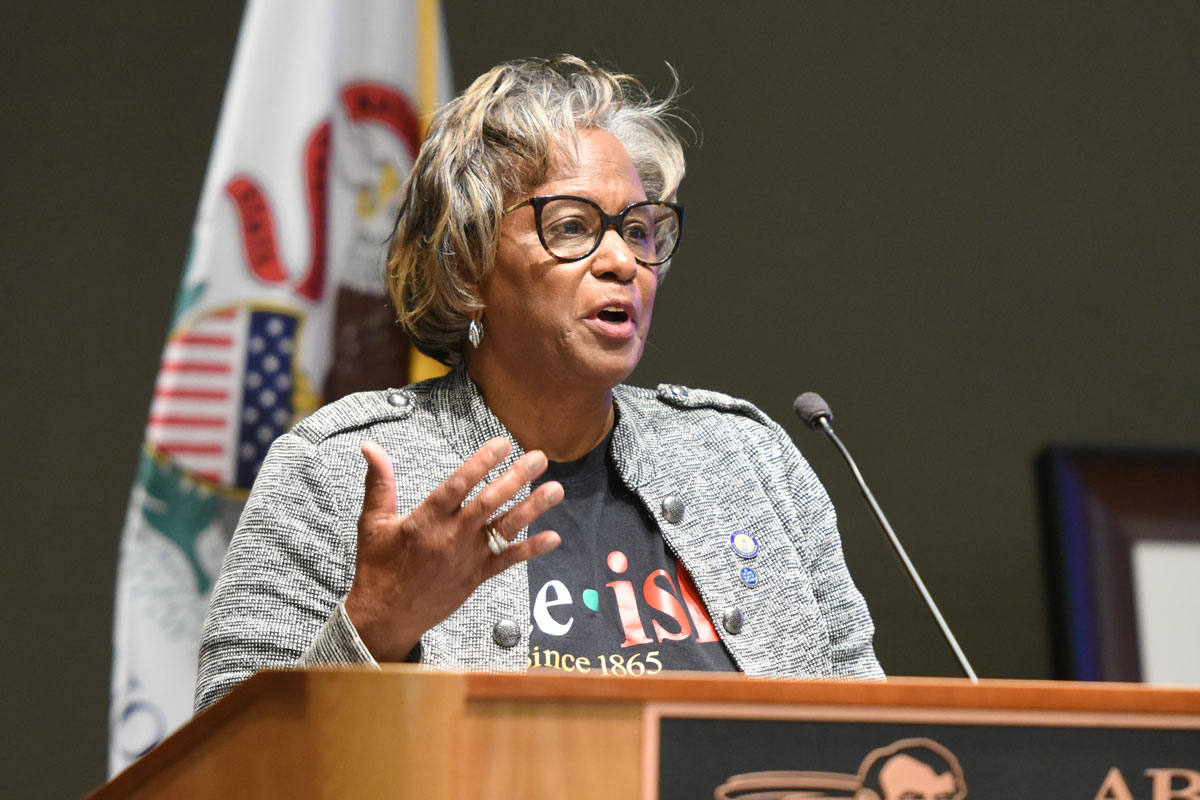- Details
- Category: Senator John Connor News
 LOCKPORT – In recognition of sacrifices made by brave Illinoisans who have served our country, State Senator John Connor (D-Lockport) is inviting people to write friendly and encouraging letters to residents of veteran’s homes ahead of Veterans Day.
LOCKPORT – In recognition of sacrifices made by brave Illinoisans who have served our country, State Senator John Connor (D-Lockport) is inviting people to write friendly and encouraging letters to residents of veteran’s homes ahead of Veterans Day.
“Our veterans have all made tremendous sacrifices for us, and Operation Rising Spirit gives us an opportunity to honor those sacrifices,” Connor said. “In our community and across the state, our service members deserve to feel recognized and appreciated for their contributions.”
Operation Rising Spirit is an initiative of the Illinois Department of Veterans’ Affairs that encourages communities to write letters to residents in the care of veterans’ homes in Illinois. At a time when isolation is at a record high, the letters are meant to extend friendly affirmation for the bravery and courage of veterans both throughout their service and the pandemic.
“Due to the COVID-19 pandemic, many residents of long-term care facilities have not been able to see friends or family for quite some time,” Connor said. “By taking the time to send kind messages and words of encouragement, we can help make our veterans across the state feel remembered and appreciated, and combat the loneliness they may be experiencing.”
The campaign will focus on veterans’ homes in Illinois, located in Anna, Chicago, LaSalle, Manteno, and Quincy. To send a message to a veteran or a veteran home, visit Send-a-note. For people wanting to send physical letters, locations for each of the veterans’ homes can be found here.
- Details
- Category: Senator Dave Koehler News
 PEORIA – In recognition of sacrifices made by brave Illinoisans who have served our country, State Senator Dave Koehler (D-Peoria) is inviting people to write friendly and encouraging letters to residents of veteran’s homes ahead of Veterans Day.
PEORIA – In recognition of sacrifices made by brave Illinoisans who have served our country, State Senator Dave Koehler (D-Peoria) is inviting people to write friendly and encouraging letters to residents of veteran’s homes ahead of Veterans Day.
“I am proud to represent a great deal of veterans across Central Illinois,” Koehler said. “Our communities benefit every day from the sacrifices they have made for us, and it is important that we show our appreciation and honor those sacrifices.”
Operation Rising Spirit is an initiative of the Illinois Department of Veterans’ Affairs that encourages communities to write letters to residents in the care of veterans’ homes in Illinois. At a time when isolation is at a record high, the letters are meant to extend friendly affirmation for the bravery and courage of veterans both throughout their service and the pandemic.
“Especially during this time of uncertainty and isolation for many people living in long-term care facilities, kind messages and words of encouragement are an easy way to make our veterans feel remembered and appreciated,” Koehler said. “I hope that members of our community will take the time to reach out and make a positive impact.”
The campaign will focus on veterans’ homes in Illinois, located in Anna, Chicago, LaSalle, Manteno, and Quincy. To send a message to a veteran or a veteran home, visit Send-a-note. For people wanting to send physical letters, locations for each of the veterans’ homes can be found here.
- Details
- Category: Senator Suzy Glowiak Hilton News
 OAKBROOK TERRACE – First-year students applying to any of Illinois’ public universities will now only need to submit one form on Common App, and State Senator Suzy Glowiak Hilton (D-Western Springs) applauded the step to increase accessibility to higher education opportunities.
OAKBROOK TERRACE – First-year students applying to any of Illinois’ public universities will now only need to submit one form on Common App, and State Senator Suzy Glowiak Hilton (D-Western Springs) applauded the step to increase accessibility to higher education opportunities.
“Applying to college can be tedious and expensive,” Glowiak Hilton said. “By using Common App, Illinois is simplifying the process and working to ensure individuals have access to higher education opportunities.”
This fall, all 12 public universities in Illinois will be available on the Common App platform, thanks to a $1 million state investment.
For families concerned about the cost of submitting college applications, waivers are available for low-income students. In addition, some colleges and universities either have no application fees or will waive fees if needed.
“Many applicants and their families are hesitant to start the college journey because of the associated costs,” Glowiak Hilton said. “Luckily, there are several aid options available to help reduce the financial burdens associated with applying for college.”
Residents are encouraged to visit the Common App website for informational resources, including a first-year application guide, videos and a complete list of institutions that use the application.
- Details
- Category: Senator Rachelle Crowe News
 MARYVILLE – To highlight an initiative to increase higher education accessibility, State Senator Rachelle Aud Crowe (D-Glen Carbon) announced first-year students applying to any of Illinois’ public universities, as well as several of the state’s private institutions, only need to submit one form on Common App.
MARYVILLE – To highlight an initiative to increase higher education accessibility, State Senator Rachelle Aud Crowe (D-Glen Carbon) announced first-year students applying to any of Illinois’ public universities, as well as several of the state’s private institutions, only need to submit one form on Common App.
“Applying to college can be confusing, tiresome and expensive,” Crowe said. “By using the Common App platform, Illinois is simplifying the process and working to ensure accessibility to higher education opportunities.”
This fall, all 12 public universities in Illinois will be available on the Common App platform, thanks to a $1 million state investment.
For families with financial concerns, waivers are available for low-income Common App applicants. In addition, some colleges and universities either have no application fees or will waive fees if needed.
“For many applicants and their families, a major concern for starting the college journey is the cost,” Crowe said. “There are several aid options available to help reduce the financial burdens associated with applying for college.”
Residents are encouraged to visit the Common App website for informational resources, including a first-year application guide, videos and a complete list of institutions that use the application.
- Details
- Category: Senator Doris Turner News
 SPRINGFIELD – State Senator Doris Turner (D-Springfield) is encouraging incoming students to take advantage of Common App – a tool to apply for multiple Illinois colleges at once.
SPRINGFIELD – State Senator Doris Turner (D-Springfield) is encouraging incoming students to take advantage of Common App – a tool to apply for multiple Illinois colleges at once.
“Common App makes college more accessible by making the application process less tedious and stressful,” Turner said. “Illinois’ best and brightest now have a streamlined and simplified process to apply to all public universities in our great state, like the University of Illinois Springfield.”
Incoming students applying to college will now be able to submit applications to any of Illinois’ 12 public universities and dozens of private institutions using just one form on commonapp.org. Once a student makes a Common App account, they will be asked to confirm which schools they’d like to apply to and review the admission requirements for those schools. They’ll then submit their application on the website, where they’ll be able to track its status.
Low-income students and their families can apply for a waiver to help cover the application cost. Over the last two years, more than 470,000 students using Common App across the country were granted a fee waiver.
- Details
- Category: Senator Patrick Joyce News
 MANTENO – As Veterans Day approaches, State Senator Patrick Joyce (D-Essex) is asking residents to write friendly, encouraging letters in an effort to thank our heroes in veterans’ homes across the state.
MANTENO – As Veterans Day approaches, State Senator Patrick Joyce (D-Essex) is asking residents to write friendly, encouraging letters in an effort to thank our heroes in veterans’ homes across the state.
“Veterans Day is a time to honor the brave American men and women who have served our country,” Joyce said. “Join me in writing letters to our veterans so we can show our appreciation to all of them.”
Operation Rising Spirit is an initiative of the Illinois Department of Veterans’ Affairs that encourages communities to write letters to residents in the care of veteran’ home in Illinois. At a time when isolation is at a record high, the letters are meant to extend friendly affirmation for the bravery and courage of veterans both throughout their service and the pandemic.
The effort was first launched in 2020 ahead of Veterans Day in November. The letter-writing campaign will focus on the veterans’ homes in Illinois, located in Anna, Chicago, LaSalle, Manteno and Quincy. Senator Joyce represents Manteno, which provides care for up to 294 skilled care and special needs veterans.
“Let’s show our support for our veterans and send these heroes letters to thank them for their service,” Joyce said.
To send a message to a veteran or a veteran home, visit Send-a-note. Locations for each of the veterans’ homes in Illinois can be found here, if someone would rather send a physical letter.
- Details
- Category: Senator Cristina Pacione-Zayas News
 FAYETTE COUNTY – As part of its Adopt-a-Legislator® program, the Fayette County Farm Bureau welcomed State Senator Cristina Pacione-Zayas (D-Chicago) to multiple farms in downstate Illinois to learn about their operations and further develop relationships with farmers in the state.
FAYETTE COUNTY – As part of its Adopt-a-Legislator® program, the Fayette County Farm Bureau welcomed State Senator Cristina Pacione-Zayas (D-Chicago) to multiple farms in downstate Illinois to learn about their operations and further develop relationships with farmers in the state.
“The time spent in Fayette County with my family during our tours of the fields and farms was enlightening,” Pacione-Zayas said. “Maintaining connections to the land and relationships with farmers across the state is important for bridging the gap between urban and rural communities in Illinois. In the months I’ve been a part of the Adopt-a-Legislator program, you recognize the significance of championing policy that benefits the agriculture industry and our environment so Illinois communities can be sustainable and thriving.”
Read more: Fayette County welcomes Sen. Pacione-Zayas for farm visits
- Details
- Category: Senator Scott Bennett News
 CHAMPAIGN – Prospective students applying to any of Illinois’ 12 public universities can now use the Common Application, and Senate Higher Education Chair Scott Bennett (D-Champaign) is encouraging incoming students to take advantage.
CHAMPAIGN – Prospective students applying to any of Illinois’ 12 public universities can now use the Common Application, and Senate Higher Education Chair Scott Bennett (D-Champaign) is encouraging incoming students to take advantage.
Bennett worked with his colleagues in the General Assembly and the Illinois Board of Higher Education to obtain $1 million in funding to add all of the state’s public universities onto the Common App platform so that students in Illinois will consider continuing their educational journey at home.
More Articles …
Page 391 of 769